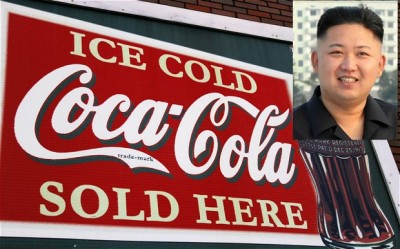Countries at War? Coca-Cola Sold in North Korea, with a Distinctive Can and DPRK Logo

A YouTube video that surfaced in August 2012 seemed to show patrons of a restaurant in Pyongyang, North Korea, drinking Coca-Cola in October 2011. This sparked controversy because a US trade embargo has banned the sale of Coca-Cola in North Korea since 1950 – but ongoing sales there seem to be an open secret outside the United States.
The pizza restaurant where the video was filmed is owned by Cortial, a joint venture between North Korea and Italy. Customers allegedly were told the soft drink was “Italian Coke,” but a screenshot from the video clearly shows Coca-Cola’s distinctive can and logo.
North Korea is one of only two countries where the sale of Coca-Cola is unauthorized, the other being Cuba (since 1962). Coca-Cola representatives have denied consent to sell their product in North Korea: “Any products sold in the market have been purchased by unauthorized third parties and imported into the country from other markets where they were sold.”
 According to Lee Suk-Yong, a North Korean defector, China has been shipping Coca-Cola across the Korean border since 2002. He also claims that Coke is available in special shops in Pyongyang but is very expensive and accessible only to the elite and foreigners. If these sales are common knowledge among defectors, why has Coca-Cola not taken steps to end them?
According to Lee Suk-Yong, a North Korean defector, China has been shipping Coca-Cola across the Korean border since 2002. He also claims that Coke is available in special shops in Pyongyang but is very expensive and accessible only to the elite and foreigners. If these sales are common knowledge among defectors, why has Coca-Cola not taken steps to end them?
Corporate media coverage of this controversy has been limited. Most news outlets that have reported it have been Korean or otherwise based outside the United States. Yahoo! Finance ran a piece on the story on Aug 31, 2012 but has not reported on it since. This story is particularly interesting considering that around the same time the video controversy began, Coca-Cola’s income began to slip thanks to sagging overseas expansion.
Sources:
“Coca-Cola available but expensive in N. Korea, defectors say.” Agence France-Presse via Inquirer Lifestyle. Sept. 1, 2012. http://lifestyle.inquirer.net/64206/coca-cola-available-but-expensive-in-n-korea-defectors-say
“Coca-Cola on sale on North Korea’s black market.” News.com.au. Sept. 2, 2012. http://www.news.com.au/world-news/coca-cola-on-sale-on-north-koreas-black-market/story-fndir2ev-1226463177234
“Coca-Cola profit slips as costs rise.” News.com.au. Aug. 2, 2012. http://www.news.com.au/business/breaking-news/coca-cola-profit-slips-as-costs-rise/story-e6frfkur-1226428577349
Hebblethwaite, Cordelia. “Who, What, Why: In which countries is Coca-Cola not sold?” BBC News Magazine. Sept. 11, 2012. http://www.bbc.co.uk/news/magazine-19550067
Nichols, Chris. “Coke (Unofficially) Crosses into North Korea.” Yahoo! Finance. Aug. 31, 2012. http://finance.yahoo.com/blogs/the-exchange/coke-unofficially-crosses-dmz-north-korea-163719971.html
Ryall, Julian. “Coca-Cola denies ‘cracking’ North Korea.” The Telegraph. Aug. 31, 2012. http://www.telegraph.co.uk/news/worldnews/asia/northkorea/9511235/Coca-Cola-denies-cracking-North-Korea.html
Young, Angelo. “Coca-Cola Denies Report It Distributes in North Korea.” International Business Times. Aug. 31, 2012. http://www.ibtimes.com/coca-cola-denies-report-it-distributes-north-korea-760529
Student Researcher: Cedric Crawley, Frostburg State University
Faculty Evaluator: Andy Duncan, Frostburg State University

